Leadership in Clinical Institution
VerifiedAdded on 2021/06/17
|10
|2805
|22
AI Summary
Contribute Materials
Your contribution can guide someone’s learning journey. Share your
documents today.
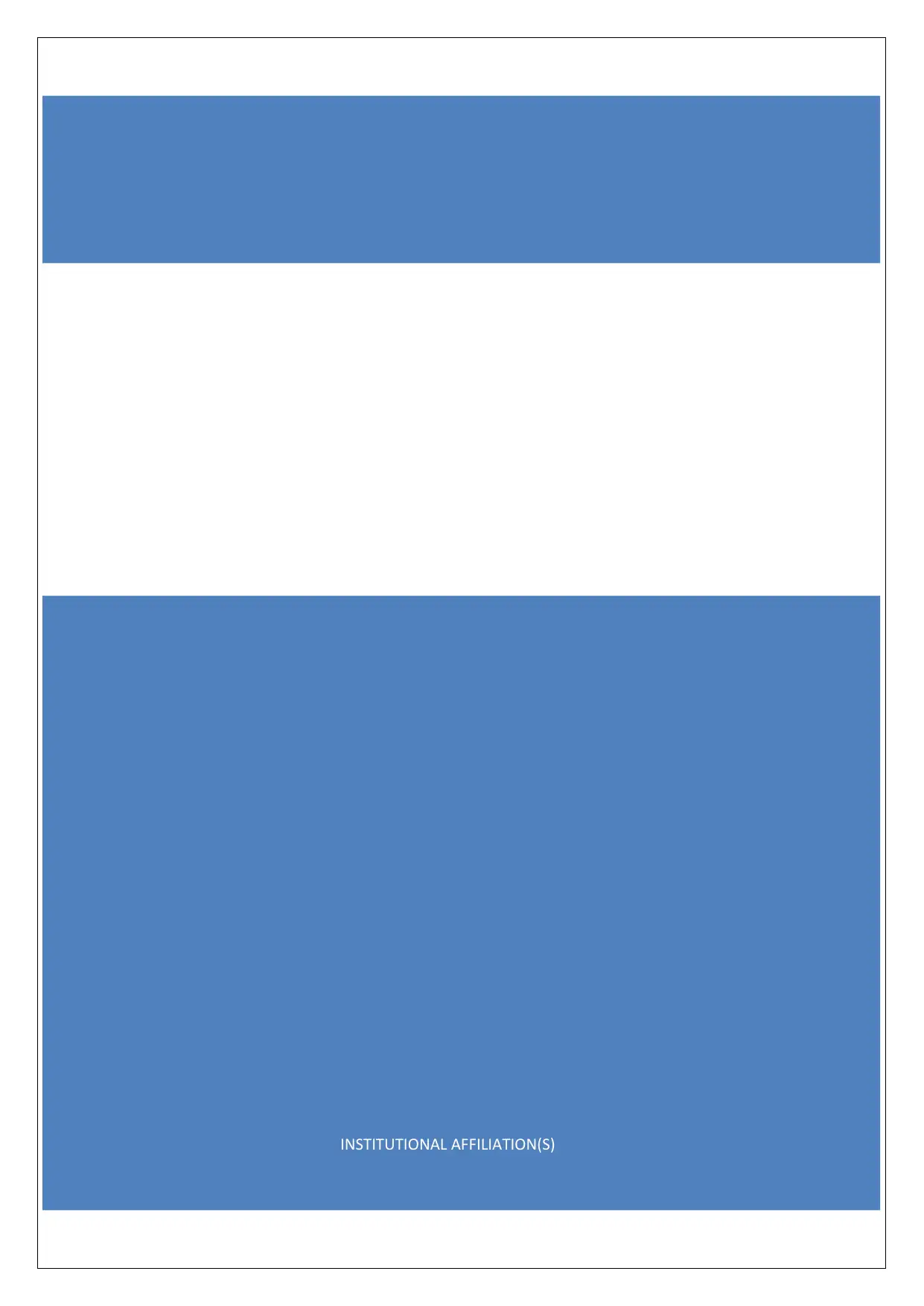
INSTITUTIONAL AFFILIATION(S)
Secure Best Marks with AI Grader
Need help grading? Try our AI Grader for instant feedback on your assignments.
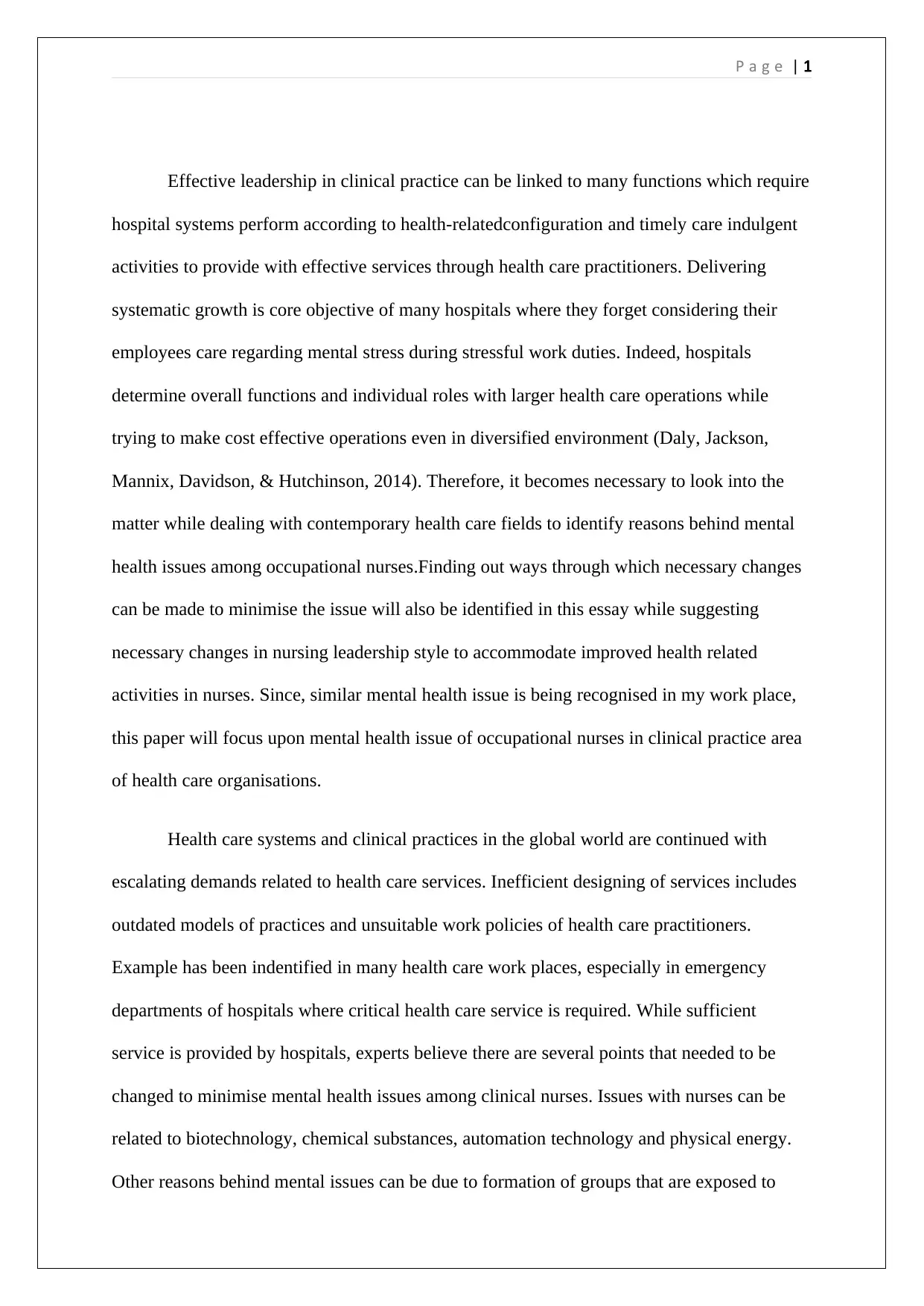
P a g e | 1
Effective leadership in clinical practice can be linked to many functions which require
hospital systems perform according to health-relatedconfiguration and timely care indulgent
activities to provide with effective services through health care practitioners. Delivering
systematic growth is core objective of many hospitals where they forget considering their
employees care regarding mental stress during stressful work duties. Indeed, hospitals
determine overall functions and individual roles with larger health care operations while
trying to make cost effective operations even in diversified environment (Daly, Jackson,
Mannix, Davidson, & Hutchinson, 2014). Therefore, it becomes necessary to look into the
matter while dealing with contemporary health care fields to identify reasons behind mental
health issues among occupational nurses.Finding out ways through which necessary changes
can be made to minimise the issue will also be identified in this essay while suggesting
necessary changes in nursing leadership style to accommodate improved health related
activities in nurses. Since, similar mental health issue is being recognised in my work place,
this paper will focus upon mental health issue of occupational nurses in clinical practice area
of health care organisations.
Health care systems and clinical practices in the global world are continued with
escalating demands related to health care services. Inefficient designing of services includes
outdated models of practices and unsuitable work policies of health care practitioners.
Example has been indentified in many health care work places, especially in emergency
departments of hospitals where critical health care service is required. While sufficient
service is provided by hospitals, experts believe there are several points that needed to be
changed to minimise mental health issues among clinical nurses. Issues with nurses can be
related to biotechnology, chemical substances, automation technology and physical energy.
Other reasons behind mental issues can be due to formation of groups that are exposed to
Effective leadership in clinical practice can be linked to many functions which require
hospital systems perform according to health-relatedconfiguration and timely care indulgent
activities to provide with effective services through health care practitioners. Delivering
systematic growth is core objective of many hospitals where they forget considering their
employees care regarding mental stress during stressful work duties. Indeed, hospitals
determine overall functions and individual roles with larger health care operations while
trying to make cost effective operations even in diversified environment (Daly, Jackson,
Mannix, Davidson, & Hutchinson, 2014). Therefore, it becomes necessary to look into the
matter while dealing with contemporary health care fields to identify reasons behind mental
health issues among occupational nurses.Finding out ways through which necessary changes
can be made to minimise the issue will also be identified in this essay while suggesting
necessary changes in nursing leadership style to accommodate improved health related
activities in nurses. Since, similar mental health issue is being recognised in my work place,
this paper will focus upon mental health issue of occupational nurses in clinical practice area
of health care organisations.
Health care systems and clinical practices in the global world are continued with
escalating demands related to health care services. Inefficient designing of services includes
outdated models of practices and unsuitable work policies of health care practitioners.
Example has been indentified in many health care work places, especially in emergency
departments of hospitals where critical health care service is required. While sufficient
service is provided by hospitals, experts believe there are several points that needed to be
changed to minimise mental health issues among clinical nurses. Issues with nurses can be
related to biotechnology, chemical substances, automation technology and physical energy.
Other reasons behind mental issues can be due to formation of groups that are exposed to
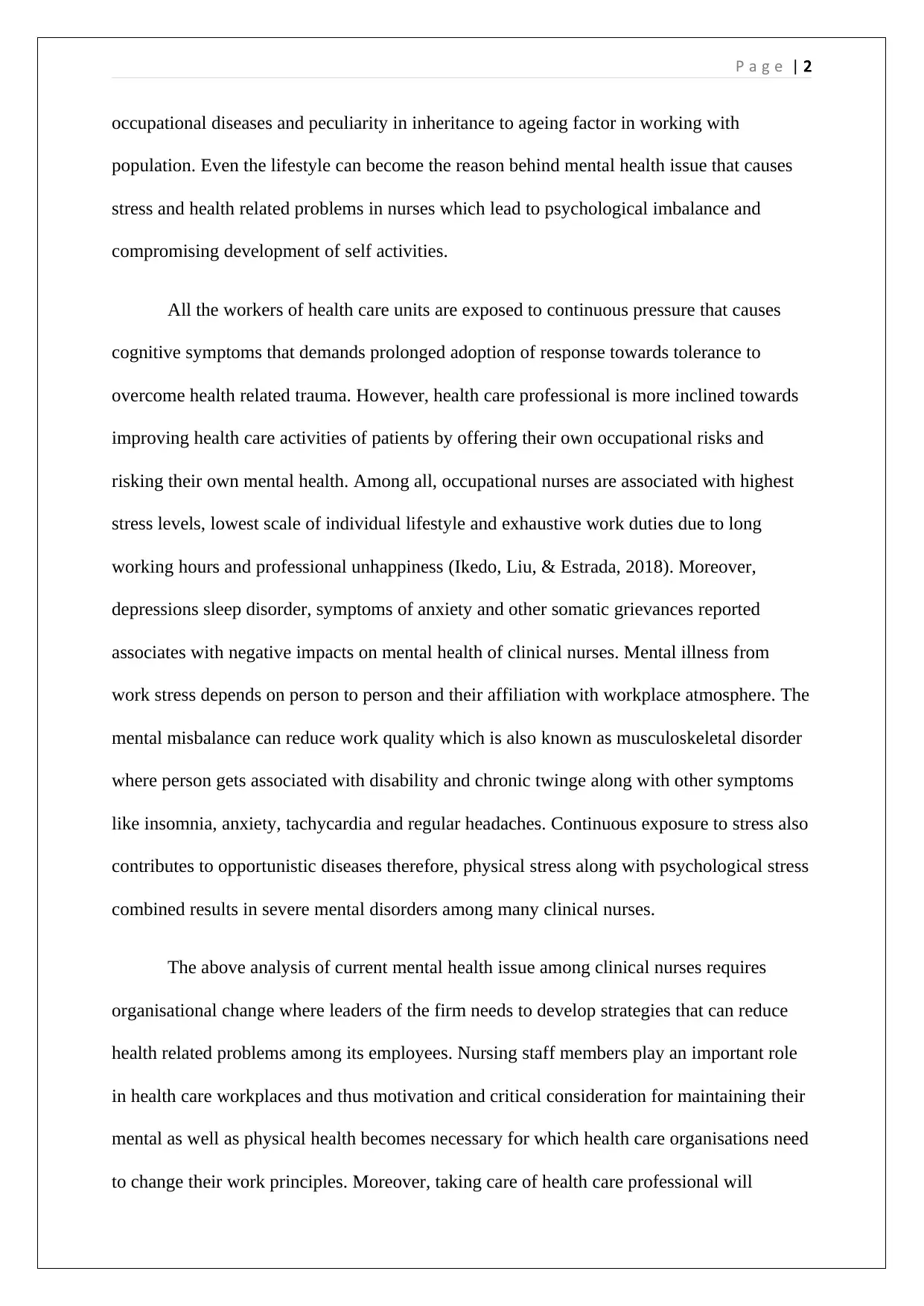
P a g e | 2
occupational diseases and peculiarity in inheritance to ageing factor in working with
population. Even the lifestyle can become the reason behind mental health issue that causes
stress and health related problems in nurses which lead to psychological imbalance and
compromising development of self activities.
All the workers of health care units are exposed to continuous pressure that causes
cognitive symptoms that demands prolonged adoption of response towards tolerance to
overcome health related trauma. However, health care professional is more inclined towards
improving health care activities of patients by offering their own occupational risks and
risking their own mental health. Among all, occupational nurses are associated with highest
stress levels, lowest scale of individual lifestyle and exhaustive work duties due to long
working hours and professional unhappiness (Ikedo, Liu, & Estrada, 2018). Moreover,
depressions sleep disorder, symptoms of anxiety and other somatic grievances reported
associates with negative impacts on mental health of clinical nurses. Mental illness from
work stress depends on person to person and their affiliation with workplace atmosphere. The
mental misbalance can reduce work quality which is also known as musculoskeletal disorder
where person gets associated with disability and chronic twinge along with other symptoms
like insomnia, anxiety, tachycardia and regular headaches. Continuous exposure to stress also
contributes to opportunistic diseases therefore, physical stress along with psychological stress
combined results in severe mental disorders among many clinical nurses.
The above analysis of current mental health issue among clinical nurses requires
organisational change where leaders of the firm needs to develop strategies that can reduce
health related problems among its employees. Nursing staff members play an important role
in health care workplaces and thus motivation and critical consideration for maintaining their
mental as well as physical health becomes necessary for which health care organisations need
to change their work principles. Moreover, taking care of health care professional will
occupational diseases and peculiarity in inheritance to ageing factor in working with
population. Even the lifestyle can become the reason behind mental health issue that causes
stress and health related problems in nurses which lead to psychological imbalance and
compromising development of self activities.
All the workers of health care units are exposed to continuous pressure that causes
cognitive symptoms that demands prolonged adoption of response towards tolerance to
overcome health related trauma. However, health care professional is more inclined towards
improving health care activities of patients by offering their own occupational risks and
risking their own mental health. Among all, occupational nurses are associated with highest
stress levels, lowest scale of individual lifestyle and exhaustive work duties due to long
working hours and professional unhappiness (Ikedo, Liu, & Estrada, 2018). Moreover,
depressions sleep disorder, symptoms of anxiety and other somatic grievances reported
associates with negative impacts on mental health of clinical nurses. Mental illness from
work stress depends on person to person and their affiliation with workplace atmosphere. The
mental misbalance can reduce work quality which is also known as musculoskeletal disorder
where person gets associated with disability and chronic twinge along with other symptoms
like insomnia, anxiety, tachycardia and regular headaches. Continuous exposure to stress also
contributes to opportunistic diseases therefore, physical stress along with psychological stress
combined results in severe mental disorders among many clinical nurses.
The above analysis of current mental health issue among clinical nurses requires
organisational change where leaders of the firm needs to develop strategies that can reduce
health related problems among its employees. Nursing staff members play an important role
in health care workplaces and thus motivation and critical consideration for maintaining their
mental as well as physical health becomes necessary for which health care organisations need
to change their work principles. Moreover, taking care of health care professional will
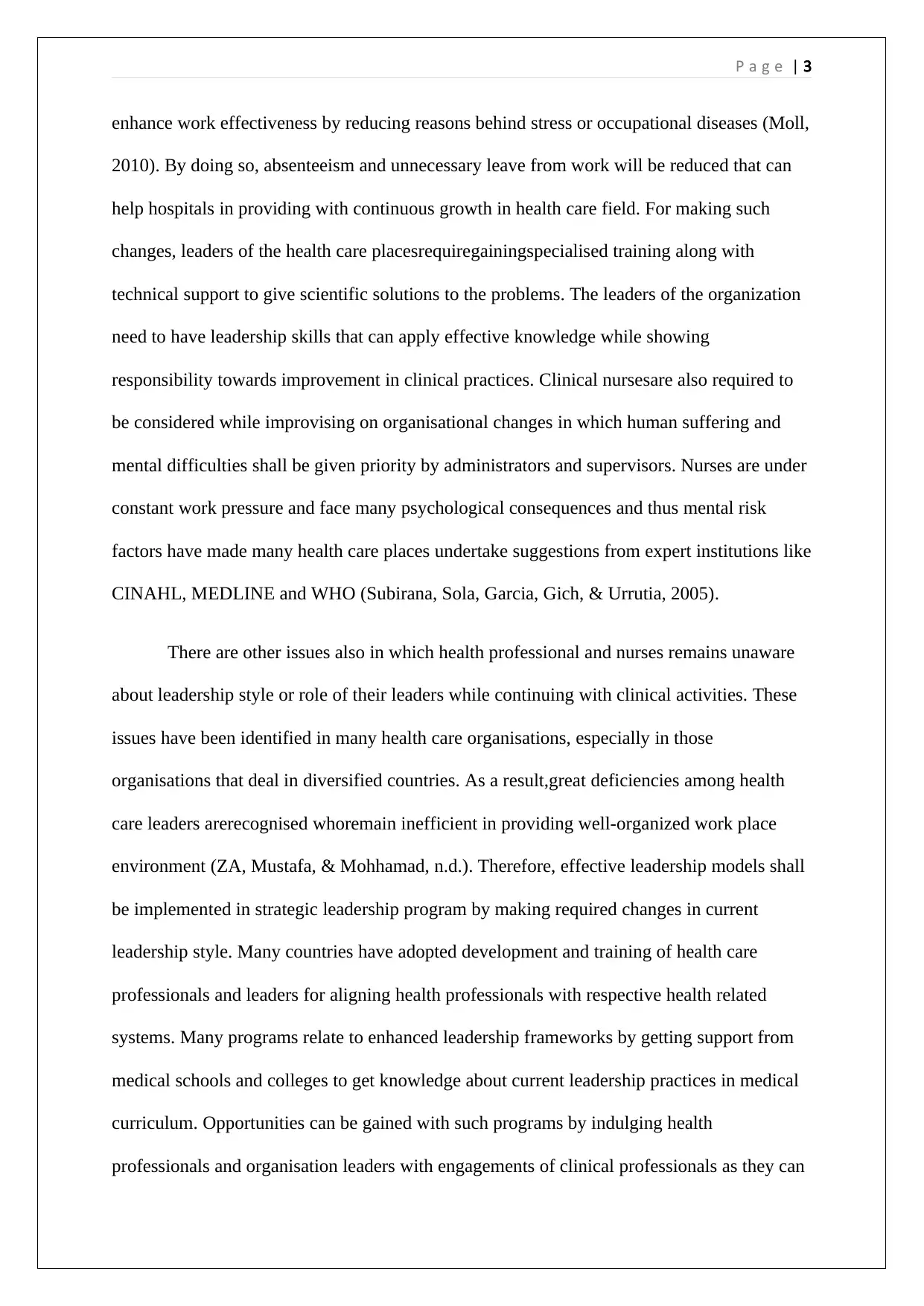
P a g e | 3
enhance work effectiveness by reducing reasons behind stress or occupational diseases (Moll,
2010). By doing so, absenteeism and unnecessary leave from work will be reduced that can
help hospitals in providing with continuous growth in health care field. For making such
changes, leaders of the health care placesrequiregainingspecialised training along with
technical support to give scientific solutions to the problems. The leaders of the organization
need to have leadership skills that can apply effective knowledge while showing
responsibility towards improvement in clinical practices. Clinical nursesare also required to
be considered while improvising on organisational changes in which human suffering and
mental difficulties shall be given priority by administrators and supervisors. Nurses are under
constant work pressure and face many psychological consequences and thus mental risk
factors have made many health care places undertake suggestions from expert institutions like
CINAHL, MEDLINE and WHO (Subirana, Sola, Garcia, Gich, & Urrutia, 2005).
There are other issues also in which health professional and nurses remains unaware
about leadership style or role of their leaders while continuing with clinical activities. These
issues have been identified in many health care organisations, especially in those
organisations that deal in diversified countries. As a result,great deficiencies among health
care leaders arerecognised whoremain inefficient in providing well-organized work place
environment (ZA, Mustafa, & Mohhamad, n.d.). Therefore, effective leadership models shall
be implemented in strategic leadership program by making required changes in current
leadership style. Many countries have adopted development and training of health care
professionals and leaders for aligning health professionals with respective health related
systems. Many programs relate to enhanced leadership frameworks by getting support from
medical schools and colleges to get knowledge about current leadership practices in medical
curriculum. Opportunities can be gained with such programs by indulging health
professionals and organisation leaders with engagements of clinical professionals as they can
enhance work effectiveness by reducing reasons behind stress or occupational diseases (Moll,
2010). By doing so, absenteeism and unnecessary leave from work will be reduced that can
help hospitals in providing with continuous growth in health care field. For making such
changes, leaders of the health care placesrequiregainingspecialised training along with
technical support to give scientific solutions to the problems. The leaders of the organization
need to have leadership skills that can apply effective knowledge while showing
responsibility towards improvement in clinical practices. Clinical nursesare also required to
be considered while improvising on organisational changes in which human suffering and
mental difficulties shall be given priority by administrators and supervisors. Nurses are under
constant work pressure and face many psychological consequences and thus mental risk
factors have made many health care places undertake suggestions from expert institutions like
CINAHL, MEDLINE and WHO (Subirana, Sola, Garcia, Gich, & Urrutia, 2005).
There are other issues also in which health professional and nurses remains unaware
about leadership style or role of their leaders while continuing with clinical activities. These
issues have been identified in many health care organisations, especially in those
organisations that deal in diversified countries. As a result,great deficiencies among health
care leaders arerecognised whoremain inefficient in providing well-organized work place
environment (ZA, Mustafa, & Mohhamad, n.d.). Therefore, effective leadership models shall
be implemented in strategic leadership program by making required changes in current
leadership style. Many countries have adopted development and training of health care
professionals and leaders for aligning health professionals with respective health related
systems. Many programs relate to enhanced leadership frameworks by getting support from
medical schools and colleges to get knowledge about current leadership practices in medical
curriculum. Opportunities can be gained with such programs by indulging health
professionals and organisation leaders with engagements of clinical professionals as they can
Secure Best Marks with AI Grader
Need help grading? Try our AI Grader for instant feedback on your assignments.
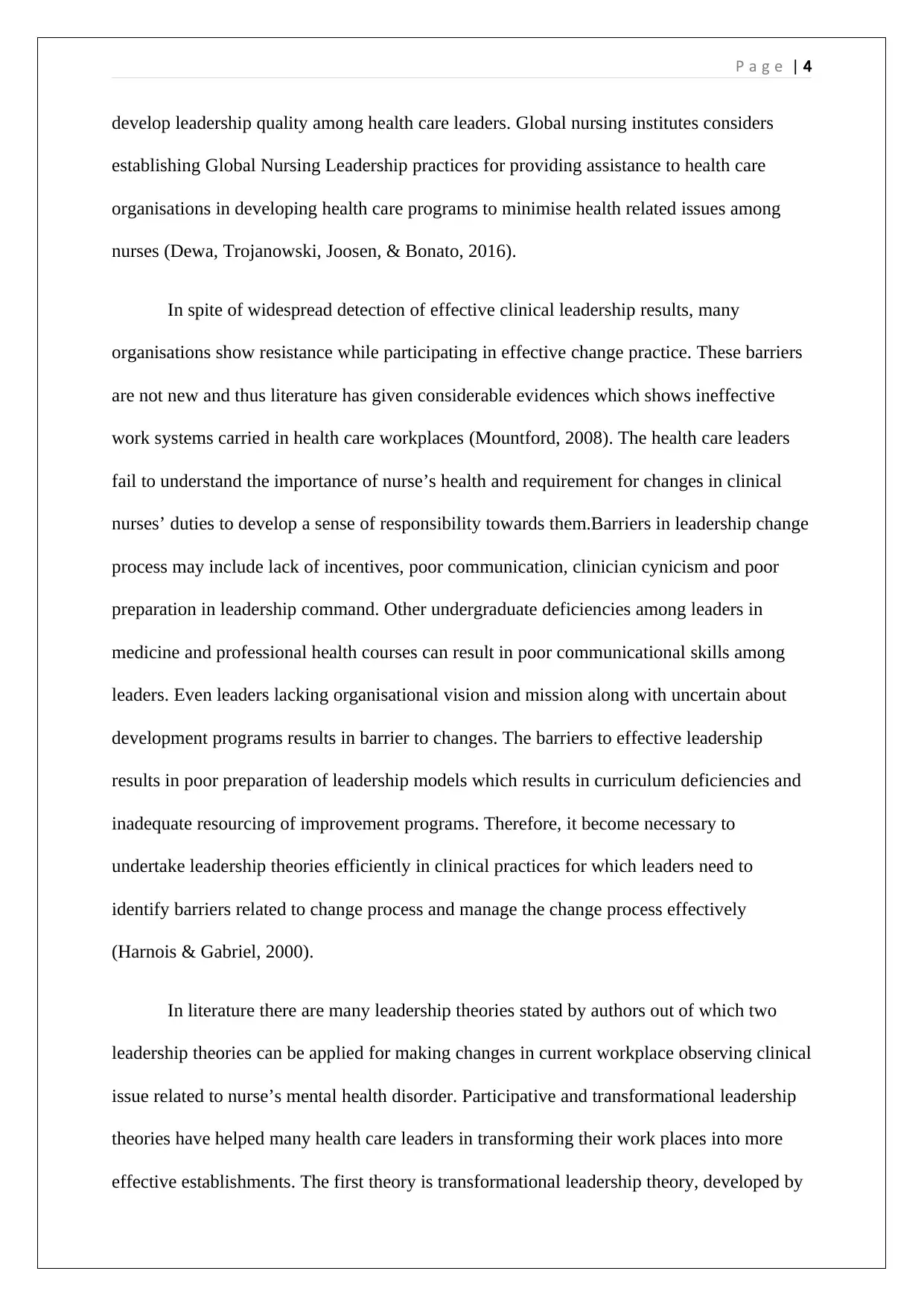
P a g e | 4
develop leadership quality among health care leaders. Global nursing institutes considers
establishing Global Nursing Leadership practices for providing assistance to health care
organisations in developing health care programs to minimise health related issues among
nurses (Dewa, Trojanowski, Joosen, & Bonato, 2016).
In spite of widespread detection of effective clinical leadership results, many
organisations show resistance while participating in effective change practice. These barriers
are not new and thus literature has given considerable evidences which shows ineffective
work systems carried in health care workplaces (Mountford, 2008). The health care leaders
fail to understand the importance of nurse’s health and requirement for changes in clinical
nurses’ duties to develop a sense of responsibility towards them.Barriers in leadership change
process may include lack of incentives, poor communication, clinician cynicism and poor
preparation in leadership command. Other undergraduate deficiencies among leaders in
medicine and professional health courses can result in poor communicational skills among
leaders. Even leaders lacking organisational vision and mission along with uncertain about
development programs results in barrier to changes. The barriers to effective leadership
results in poor preparation of leadership models which results in curriculum deficiencies and
inadequate resourcing of improvement programs. Therefore, it become necessary to
undertake leadership theories efficiently in clinical practices for which leaders need to
identify barriers related to change process and manage the change process effectively
(Harnois & Gabriel, 2000).
In literature there are many leadership theories stated by authors out of which two
leadership theories can be applied for making changes in current workplace observing clinical
issue related to nurse’s mental health disorder. Participative and transformational leadership
theories have helped many health care leaders in transforming their work places into more
effective establishments. The first theory is transformational leadership theory, developed by
develop leadership quality among health care leaders. Global nursing institutes considers
establishing Global Nursing Leadership practices for providing assistance to health care
organisations in developing health care programs to minimise health related issues among
nurses (Dewa, Trojanowski, Joosen, & Bonato, 2016).
In spite of widespread detection of effective clinical leadership results, many
organisations show resistance while participating in effective change practice. These barriers
are not new and thus literature has given considerable evidences which shows ineffective
work systems carried in health care workplaces (Mountford, 2008). The health care leaders
fail to understand the importance of nurse’s health and requirement for changes in clinical
nurses’ duties to develop a sense of responsibility towards them.Barriers in leadership change
process may include lack of incentives, poor communication, clinician cynicism and poor
preparation in leadership command. Other undergraduate deficiencies among leaders in
medicine and professional health courses can result in poor communicational skills among
leaders. Even leaders lacking organisational vision and mission along with uncertain about
development programs results in barrier to changes. The barriers to effective leadership
results in poor preparation of leadership models which results in curriculum deficiencies and
inadequate resourcing of improvement programs. Therefore, it become necessary to
undertake leadership theories efficiently in clinical practices for which leaders need to
identify barriers related to change process and manage the change process effectively
(Harnois & Gabriel, 2000).
In literature there are many leadership theories stated by authors out of which two
leadership theories can be applied for making changes in current workplace observing clinical
issue related to nurse’s mental health disorder. Participative and transformational leadership
theories have helped many health care leaders in transforming their work places into more
effective establishments. The first theory is transformational leadership theory, developed by
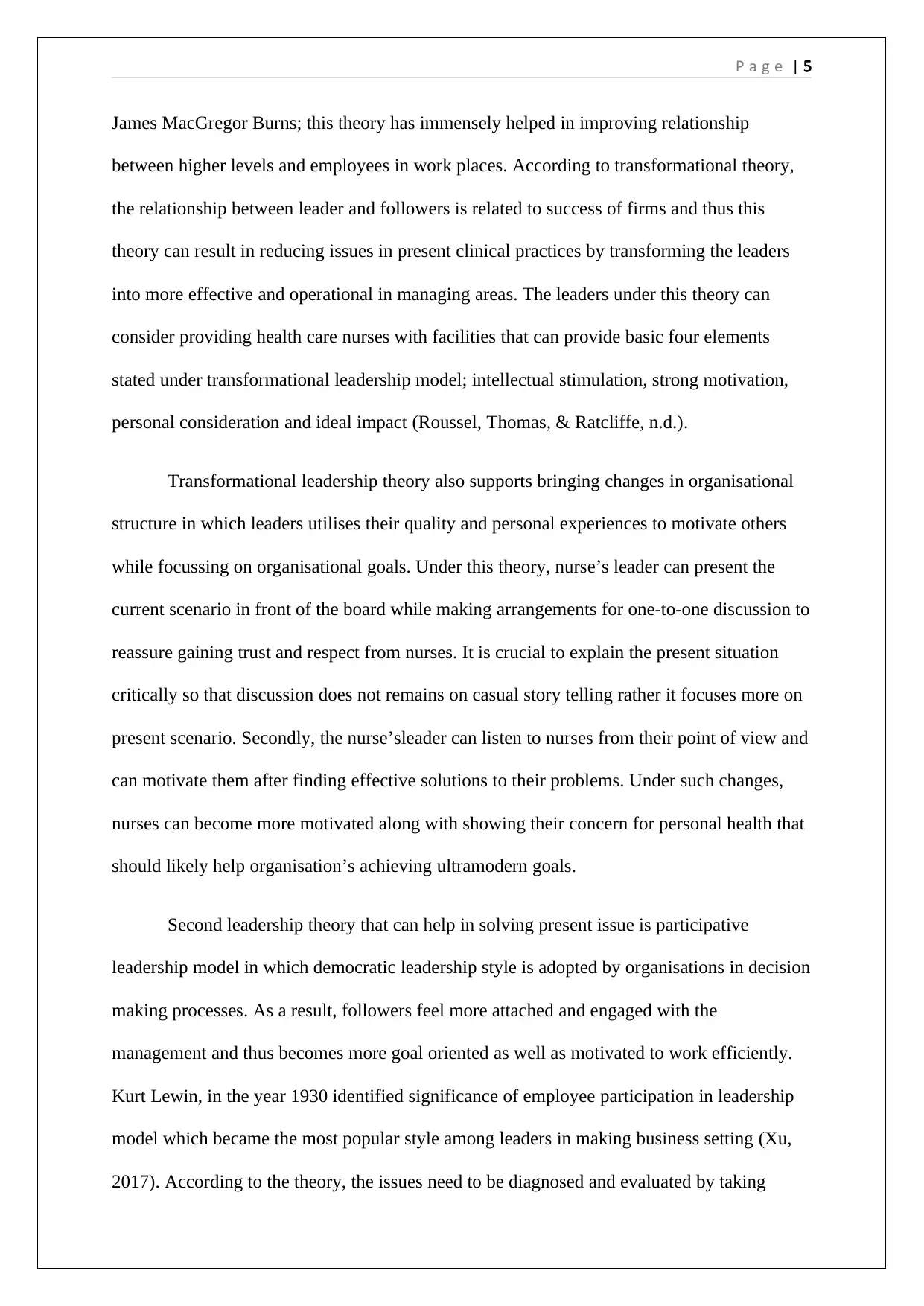
P a g e | 5
James MacGregor Burns; this theory has immensely helped in improving relationship
between higher levels and employees in work places. According to transformational theory,
the relationship between leader and followers is related to success of firms and thus this
theory can result in reducing issues in present clinical practices by transforming the leaders
into more effective and operational in managing areas. The leaders under this theory can
consider providing health care nurses with facilities that can provide basic four elements
stated under transformational leadership model; intellectual stimulation, strong motivation,
personal consideration and ideal impact (Roussel, Thomas, & Ratcliffe, n.d.).
Transformational leadership theory also supports bringing changes in organisational
structure in which leaders utilises their quality and personal experiences to motivate others
while focussing on organisational goals. Under this theory, nurse’s leader can present the
current scenario in front of the board while making arrangements for one-to-one discussion to
reassure gaining trust and respect from nurses. It is crucial to explain the present situation
critically so that discussion does not remains on casual story telling rather it focuses more on
present scenario. Secondly, the nurse’sleader can listen to nurses from their point of view and
can motivate them after finding effective solutions to their problems. Under such changes,
nurses can become more motivated along with showing their concern for personal health that
should likely help organisation’s achieving ultramodern goals.
Second leadership theory that can help in solving present issue is participative
leadership model in which democratic leadership style is adopted by organisations in decision
making processes. As a result, followers feel more attached and engaged with the
management and thus becomes more goal oriented as well as motivated to work efficiently.
Kurt Lewin, in the year 1930 identified significance of employee participation in leadership
model which became the most popular style among leaders in making business setting (Xu,
2017). According to the theory, the issues need to be diagnosed and evaluated by taking
James MacGregor Burns; this theory has immensely helped in improving relationship
between higher levels and employees in work places. According to transformational theory,
the relationship between leader and followers is related to success of firms and thus this
theory can result in reducing issues in present clinical practices by transforming the leaders
into more effective and operational in managing areas. The leaders under this theory can
consider providing health care nurses with facilities that can provide basic four elements
stated under transformational leadership model; intellectual stimulation, strong motivation,
personal consideration and ideal impact (Roussel, Thomas, & Ratcliffe, n.d.).
Transformational leadership theory also supports bringing changes in organisational
structure in which leaders utilises their quality and personal experiences to motivate others
while focussing on organisational goals. Under this theory, nurse’s leader can present the
current scenario in front of the board while making arrangements for one-to-one discussion to
reassure gaining trust and respect from nurses. It is crucial to explain the present situation
critically so that discussion does not remains on casual story telling rather it focuses more on
present scenario. Secondly, the nurse’sleader can listen to nurses from their point of view and
can motivate them after finding effective solutions to their problems. Under such changes,
nurses can become more motivated along with showing their concern for personal health that
should likely help organisation’s achieving ultramodern goals.
Second leadership theory that can help in solving present issue is participative
leadership model in which democratic leadership style is adopted by organisations in decision
making processes. As a result, followers feel more attached and engaged with the
management and thus becomes more goal oriented as well as motivated to work efficiently.
Kurt Lewin, in the year 1930 identified significance of employee participation in leadership
model which became the most popular style among leaders in making business setting (Xu,
2017). According to the theory, the issues need to be diagnosed and evaluated by taking
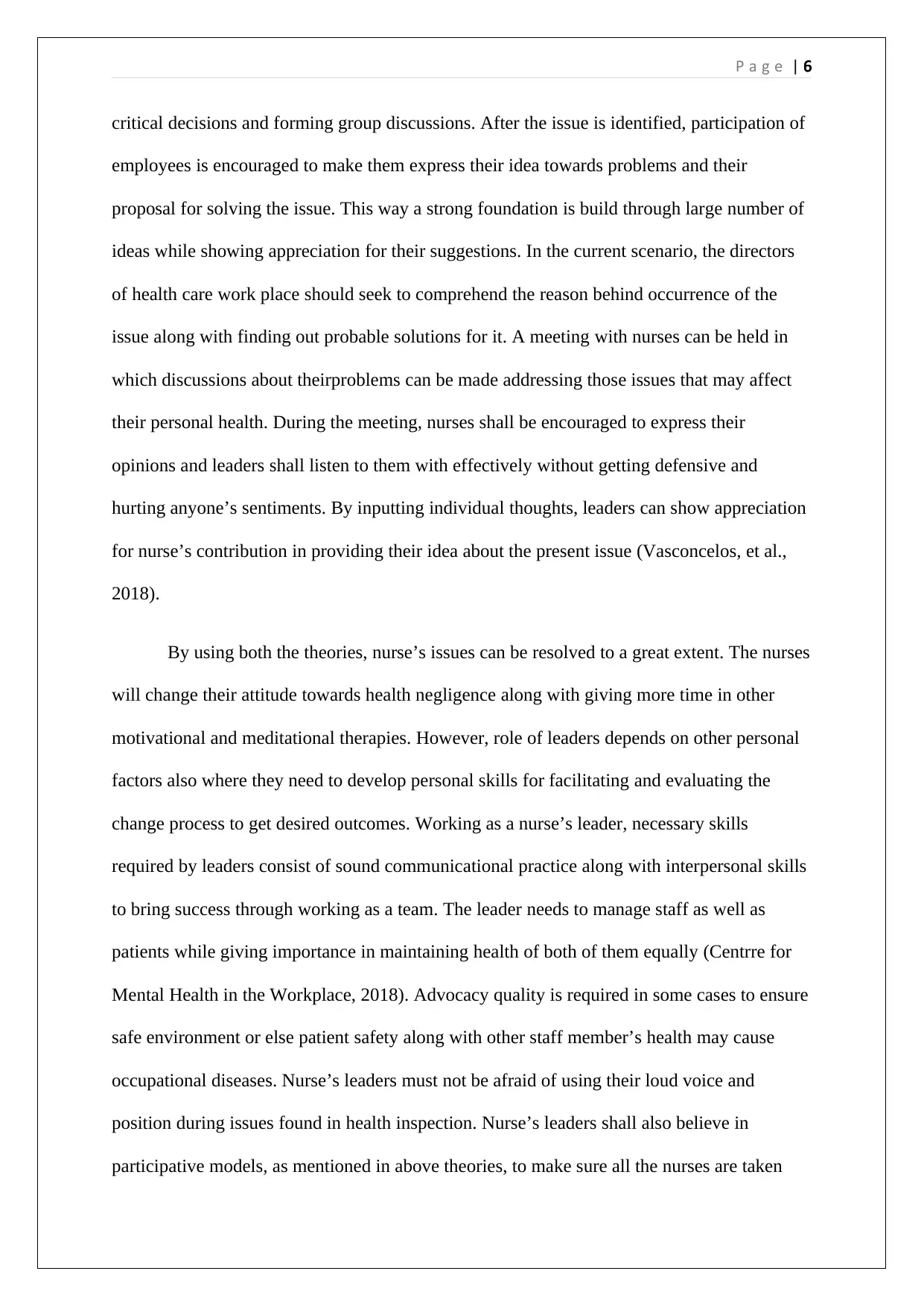
P a g e | 6
critical decisions and forming group discussions. After the issue is identified, participation of
employees is encouraged to make them express their idea towards problems and their
proposal for solving the issue. This way a strong foundation is build through large number of
ideas while showing appreciation for their suggestions. In the current scenario, the directors
of health care work place should seek to comprehend the reason behind occurrence of the
issue along with finding out probable solutions for it. A meeting with nurses can be held in
which discussions about theirproblems can be made addressing those issues that may affect
their personal health. During the meeting, nurses shall be encouraged to express their
opinions and leaders shall listen to them with effectively without getting defensive and
hurting anyone’s sentiments. By inputting individual thoughts, leaders can show appreciation
for nurse’s contribution in providing their idea about the present issue (Vasconcelos, et al.,
2018).
By using both the theories, nurse’s issues can be resolved to a great extent. The nurses
will change their attitude towards health negligence along with giving more time in other
motivational and meditational therapies. However, role of leaders depends on other personal
factors also where they need to develop personal skills for facilitating and evaluating the
change process to get desired outcomes. Working as a nurse’s leader, necessary skills
required by leaders consist of sound communicational practice along with interpersonal skills
to bring success through working as a team. The leader needs to manage staff as well as
patients while giving importance in maintaining health of both of them equally (Centrre for
Mental Health in the Workplace, 2018). Advocacy quality is required in some cases to ensure
safe environment or else patient safety along with other staff member’s health may cause
occupational diseases. Nurse’s leaders must not be afraid of using their loud voice and
position during issues found in health inspection. Nurse’s leaders shall also believe in
participative models, as mentioned in above theories, to make sure all the nurses are taken
critical decisions and forming group discussions. After the issue is identified, participation of
employees is encouraged to make them express their idea towards problems and their
proposal for solving the issue. This way a strong foundation is build through large number of
ideas while showing appreciation for their suggestions. In the current scenario, the directors
of health care work place should seek to comprehend the reason behind occurrence of the
issue along with finding out probable solutions for it. A meeting with nurses can be held in
which discussions about theirproblems can be made addressing those issues that may affect
their personal health. During the meeting, nurses shall be encouraged to express their
opinions and leaders shall listen to them with effectively without getting defensive and
hurting anyone’s sentiments. By inputting individual thoughts, leaders can show appreciation
for nurse’s contribution in providing their idea about the present issue (Vasconcelos, et al.,
2018).
By using both the theories, nurse’s issues can be resolved to a great extent. The nurses
will change their attitude towards health negligence along with giving more time in other
motivational and meditational therapies. However, role of leaders depends on other personal
factors also where they need to develop personal skills for facilitating and evaluating the
change process to get desired outcomes. Working as a nurse’s leader, necessary skills
required by leaders consist of sound communicational practice along with interpersonal skills
to bring success through working as a team. The leader needs to manage staff as well as
patients while giving importance in maintaining health of both of them equally (Centrre for
Mental Health in the Workplace, 2018). Advocacy quality is required in some cases to ensure
safe environment or else patient safety along with other staff member’s health may cause
occupational diseases. Nurse’s leaders must not be afraid of using their loud voice and
position during issues found in health inspection. Nurse’s leaders shall also believe in
participative models, as mentioned in above theories, to make sure all the nurses are taken
Paraphrase This Document
Need a fresh take? Get an instant paraphrase of this document with our AI Paraphraser
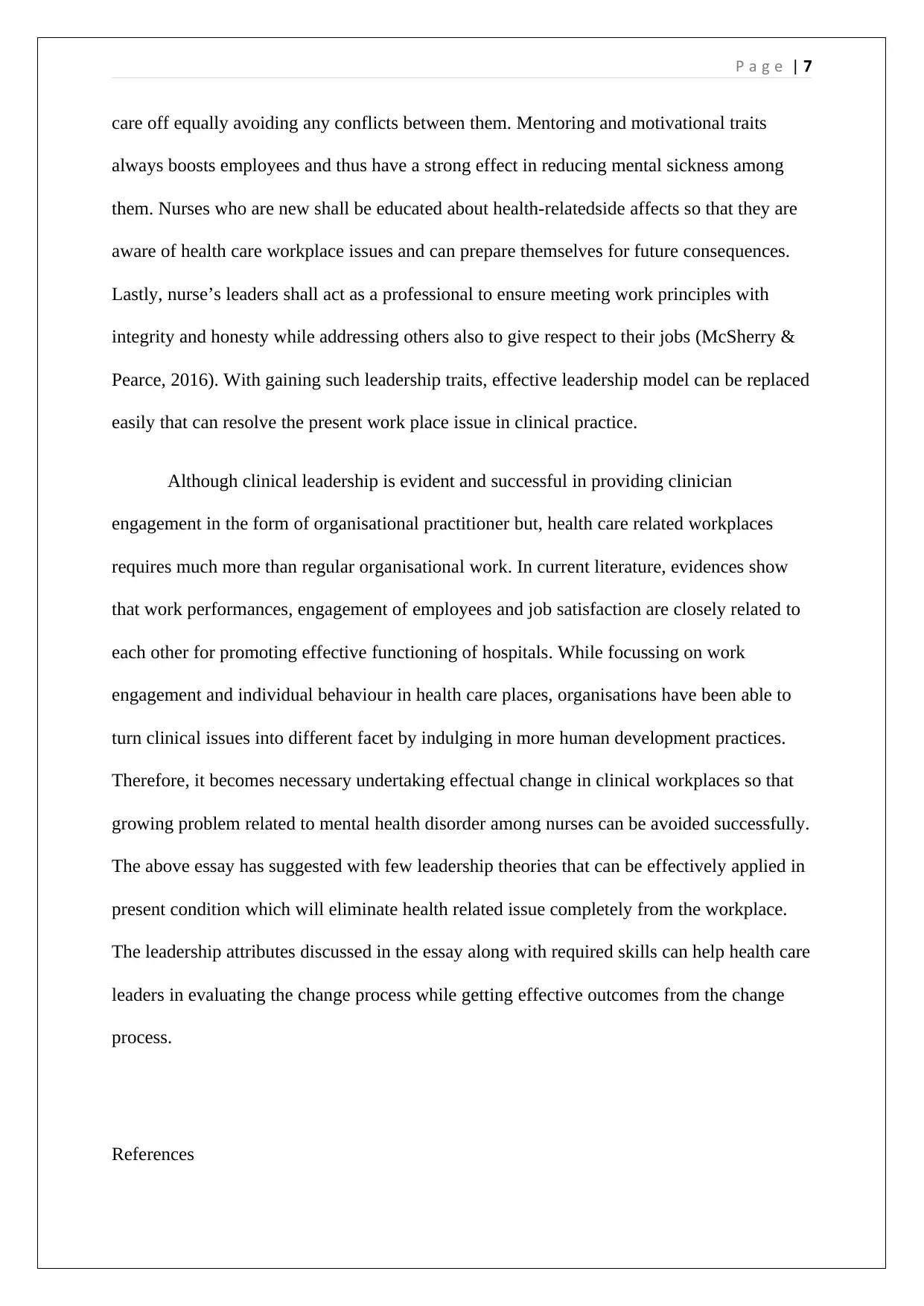
P a g e | 7
care off equally avoiding any conflicts between them. Mentoring and motivational traits
always boosts employees and thus have a strong effect in reducing mental sickness among
them. Nurses who are new shall be educated about health-relatedside affects so that they are
aware of health care workplace issues and can prepare themselves for future consequences.
Lastly, nurse’s leaders shall act as a professional to ensure meeting work principles with
integrity and honesty while addressing others also to give respect to their jobs (McSherry &
Pearce, 2016). With gaining such leadership traits, effective leadership model can be replaced
easily that can resolve the present work place issue in clinical practice.
Although clinical leadership is evident and successful in providing clinician
engagement in the form of organisational practitioner but, health care related workplaces
requires much more than regular organisational work. In current literature, evidences show
that work performances, engagement of employees and job satisfaction are closely related to
each other for promoting effective functioning of hospitals. While focussing on work
engagement and individual behaviour in health care places, organisations have been able to
turn clinical issues into different facet by indulging in more human development practices.
Therefore, it becomes necessary undertaking effectual change in clinical workplaces so that
growing problem related to mental health disorder among nurses can be avoided successfully.
The above essay has suggested with few leadership theories that can be effectively applied in
present condition which will eliminate health related issue completely from the workplace.
The leadership attributes discussed in the essay along with required skills can help health care
leaders in evaluating the change process while getting effective outcomes from the change
process.
References
care off equally avoiding any conflicts between them. Mentoring and motivational traits
always boosts employees and thus have a strong effect in reducing mental sickness among
them. Nurses who are new shall be educated about health-relatedside affects so that they are
aware of health care workplace issues and can prepare themselves for future consequences.
Lastly, nurse’s leaders shall act as a professional to ensure meeting work principles with
integrity and honesty while addressing others also to give respect to their jobs (McSherry &
Pearce, 2016). With gaining such leadership traits, effective leadership model can be replaced
easily that can resolve the present work place issue in clinical practice.
Although clinical leadership is evident and successful in providing clinician
engagement in the form of organisational practitioner but, health care related workplaces
requires much more than regular organisational work. In current literature, evidences show
that work performances, engagement of employees and job satisfaction are closely related to
each other for promoting effective functioning of hospitals. While focussing on work
engagement and individual behaviour in health care places, organisations have been able to
turn clinical issues into different facet by indulging in more human development practices.
Therefore, it becomes necessary undertaking effectual change in clinical workplaces so that
growing problem related to mental health disorder among nurses can be avoided successfully.
The above essay has suggested with few leadership theories that can be effectively applied in
present condition which will eliminate health related issue completely from the workplace.
The leadership attributes discussed in the essay along with required skills can help health care
leaders in evaluating the change process while getting effective outcomes from the change
process.
References
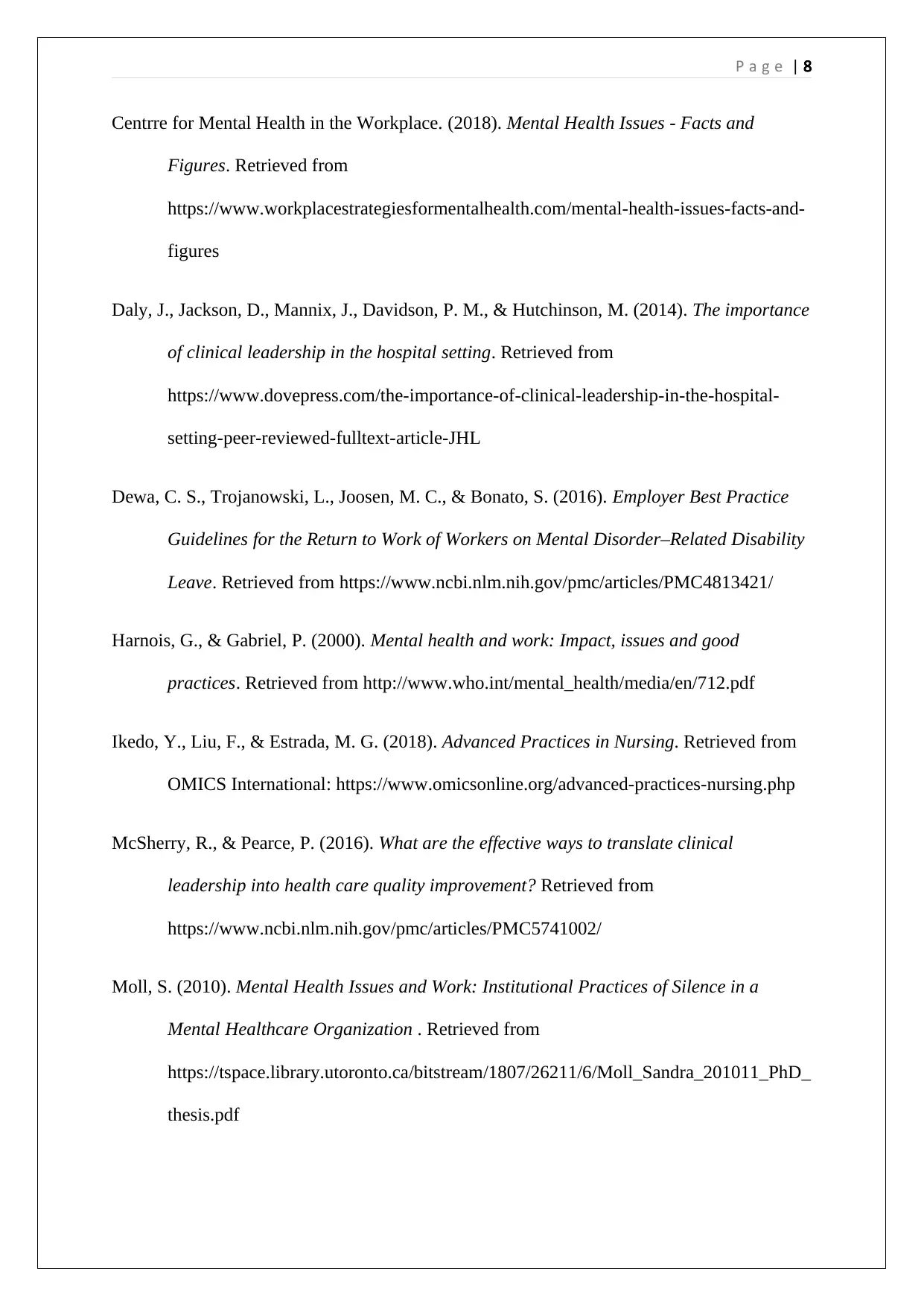
P a g e | 8
Centrre for Mental Health in the Workplace. (2018). Mental Health Issues - Facts and
Figures. Retrieved from
https://www.workplacestrategiesformentalhealth.com/mental-health-issues-facts-and-
figures
Daly, J., Jackson, D., Mannix, J., Davidson, P. M., & Hutchinson, M. (2014). The importance
of clinical leadership in the hospital setting. Retrieved from
https://www.dovepress.com/the-importance-of-clinical-leadership-in-the-hospital-
setting-peer-reviewed-fulltext-article-JHL
Dewa, C. S., Trojanowski, L., Joosen, M. C., & Bonato, S. (2016). Employer Best Practice
Guidelines for the Return to Work of Workers on Mental Disorder–Related Disability
Leave. Retrieved from https://www.ncbi.nlm.nih.gov/pmc/articles/PMC4813421/
Harnois, G., & Gabriel, P. (2000). Mental health and work: Impact, issues and good
practices. Retrieved from http://www.who.int/mental_health/media/en/712.pdf
Ikedo, Y., Liu, F., & Estrada, M. G. (2018). Advanced Practices in Nursing. Retrieved from
OMICS International: https://www.omicsonline.org/advanced-practices-nursing.php
McSherry, R., & Pearce, P. (2016). What are the effective ways to translate clinical
leadership into health care quality improvement? Retrieved from
https://www.ncbi.nlm.nih.gov/pmc/articles/PMC5741002/
Moll, S. (2010). Mental Health Issues and Work: Institutional Practices of Silence in a
Mental Healthcare Organization . Retrieved from
https://tspace.library.utoronto.ca/bitstream/1807/26211/6/Moll_Sandra_201011_PhD_
thesis.pdf
Centrre for Mental Health in the Workplace. (2018). Mental Health Issues - Facts and
Figures. Retrieved from
https://www.workplacestrategiesformentalhealth.com/mental-health-issues-facts-and-
figures
Daly, J., Jackson, D., Mannix, J., Davidson, P. M., & Hutchinson, M. (2014). The importance
of clinical leadership in the hospital setting. Retrieved from
https://www.dovepress.com/the-importance-of-clinical-leadership-in-the-hospital-
setting-peer-reviewed-fulltext-article-JHL
Dewa, C. S., Trojanowski, L., Joosen, M. C., & Bonato, S. (2016). Employer Best Practice
Guidelines for the Return to Work of Workers on Mental Disorder–Related Disability
Leave. Retrieved from https://www.ncbi.nlm.nih.gov/pmc/articles/PMC4813421/
Harnois, G., & Gabriel, P. (2000). Mental health and work: Impact, issues and good
practices. Retrieved from http://www.who.int/mental_health/media/en/712.pdf
Ikedo, Y., Liu, F., & Estrada, M. G. (2018). Advanced Practices in Nursing. Retrieved from
OMICS International: https://www.omicsonline.org/advanced-practices-nursing.php
McSherry, R., & Pearce, P. (2016). What are the effective ways to translate clinical
leadership into health care quality improvement? Retrieved from
https://www.ncbi.nlm.nih.gov/pmc/articles/PMC5741002/
Moll, S. (2010). Mental Health Issues and Work: Institutional Practices of Silence in a
Mental Healthcare Organization . Retrieved from
https://tspace.library.utoronto.ca/bitstream/1807/26211/6/Moll_Sandra_201011_PhD_
thesis.pdf
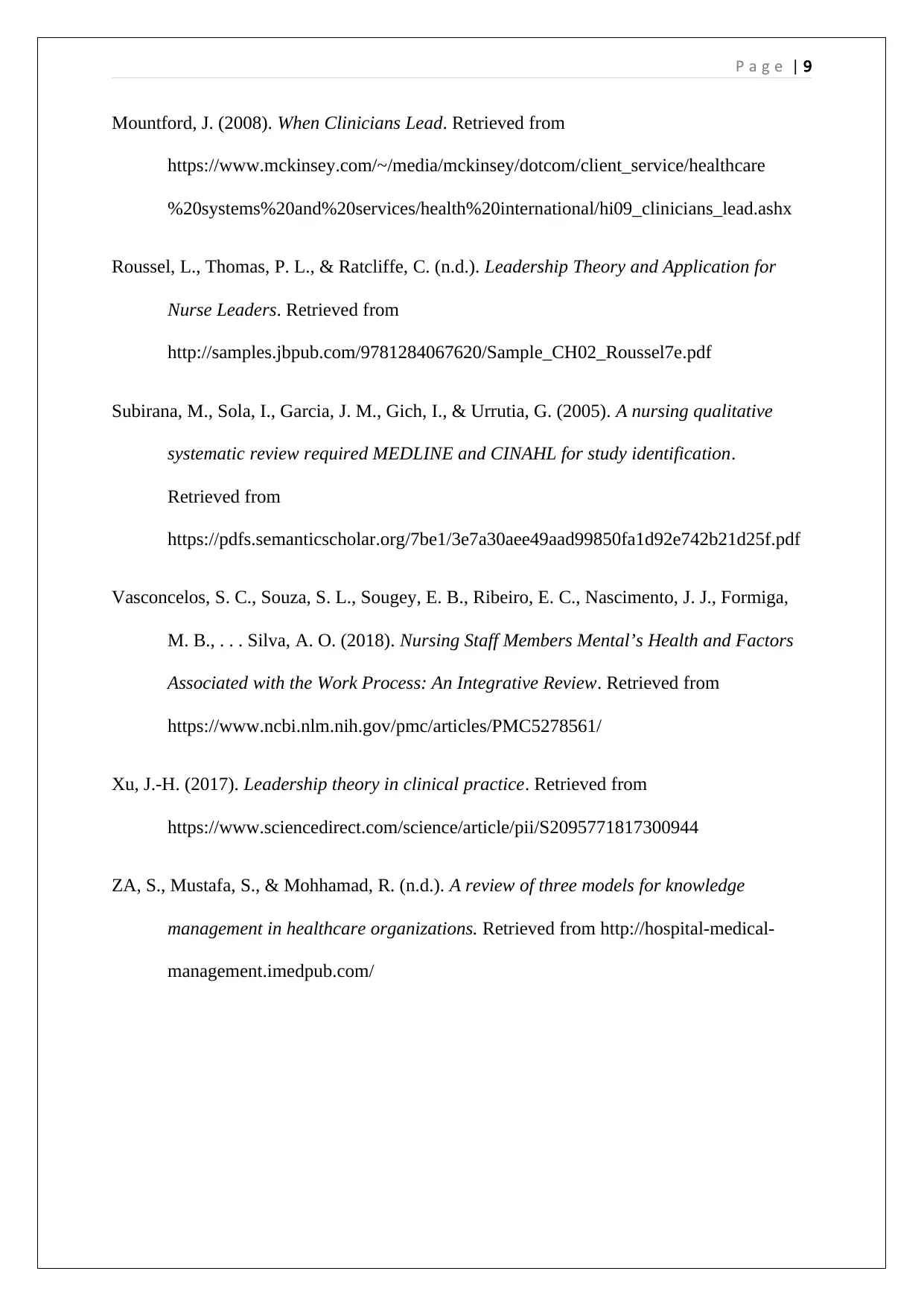
P a g e | 9
Mountford, J. (2008). When Clinicians Lead. Retrieved from
https://www.mckinsey.com/~/media/mckinsey/dotcom/client_service/healthcare
%20systems%20and%20services/health%20international/hi09_clinicians_lead.ashx
Roussel, L., Thomas, P. L., & Ratcliffe, C. (n.d.). Leadership Theory and Application for
Nurse Leaders. Retrieved from
http://samples.jbpub.com/9781284067620/Sample_CH02_Roussel7e.pdf
Subirana, M., Sola, I., Garcia, J. M., Gich, I., & Urrutia, G. (2005). A nursing qualitative
systematic review required MEDLINE and CINAHL for study identification.
Retrieved from
https://pdfs.semanticscholar.org/7be1/3e7a30aee49aad99850fa1d92e742b21d25f.pdf
Vasconcelos, S. C., Souza, S. L., Sougey, E. B., Ribeiro, E. C., Nascimento, J. J., Formiga,
M. B., . . . Silva, A. O. (2018). Nursing Staff Members Mental’s Health and Factors
Associated with the Work Process: An Integrative Review. Retrieved from
https://www.ncbi.nlm.nih.gov/pmc/articles/PMC5278561/
Xu, J.-H. (2017). Leadership theory in clinical practice. Retrieved from
https://www.sciencedirect.com/science/article/pii/S2095771817300944
ZA, S., Mustafa, S., & Mohhamad, R. (n.d.). A review of three models for knowledge
management in healthcare organizations. Retrieved from http://hospital-medical-
management.imedpub.com/
Mountford, J. (2008). When Clinicians Lead. Retrieved from
https://www.mckinsey.com/~/media/mckinsey/dotcom/client_service/healthcare
%20systems%20and%20services/health%20international/hi09_clinicians_lead.ashx
Roussel, L., Thomas, P. L., & Ratcliffe, C. (n.d.). Leadership Theory and Application for
Nurse Leaders. Retrieved from
http://samples.jbpub.com/9781284067620/Sample_CH02_Roussel7e.pdf
Subirana, M., Sola, I., Garcia, J. M., Gich, I., & Urrutia, G. (2005). A nursing qualitative
systematic review required MEDLINE and CINAHL for study identification.
Retrieved from
https://pdfs.semanticscholar.org/7be1/3e7a30aee49aad99850fa1d92e742b21d25f.pdf
Vasconcelos, S. C., Souza, S. L., Sougey, E. B., Ribeiro, E. C., Nascimento, J. J., Formiga,
M. B., . . . Silva, A. O. (2018). Nursing Staff Members Mental’s Health and Factors
Associated with the Work Process: An Integrative Review. Retrieved from
https://www.ncbi.nlm.nih.gov/pmc/articles/PMC5278561/
Xu, J.-H. (2017). Leadership theory in clinical practice. Retrieved from
https://www.sciencedirect.com/science/article/pii/S2095771817300944
ZA, S., Mustafa, S., & Mohhamad, R. (n.d.). A review of three models for knowledge
management in healthcare organizations. Retrieved from http://hospital-medical-
management.imedpub.com/
1 out of 10
Related Documents
Your All-in-One AI-Powered Toolkit for Academic Success.
+13062052269
info@desklib.com
Available 24*7 on WhatsApp / Email
![[object Object]](/_next/static/media/star-bottom.7253800d.svg)
Unlock your academic potential
© 2024 | Zucol Services PVT LTD | All rights reserved.





